336. According to Wikipedia Betelgeuze disappeared from view during about (172 - 19) - (79 - 14) = 88 nights.
... The total number of notches (88) not only coincides with the number of days in 3 lunations (88.5) but also approximately with the number of days when the star Betelgeuse (α Ori) disappeared from view each year between its heliacal set (about 14 days before the spring equinox around 33,000 BP) and its heliacal rise (approximately 19 days before the summer solstice) ...
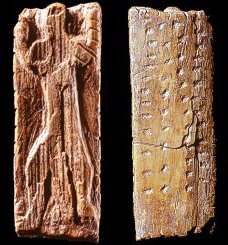
At the time of rongorongo Betelgeuze would have risen with the Sun in June 17 (168):
| CLOSE TO THE SUN: |
| 9-26 |
9-27 (*190) |
9-28 |
9-29 |
9-30 (273 = 3 * 91) |
| OCT 11 (*204) |
12 |
13 |
14 |
15 (288) |
 |
 |
 |
 |
 |
| Ga8-1 (204) |
Ga8-2 |
Ga8-3 |
Ga8-4 |
Ga8-5 |
| KELB ALRAI (Dog of the Shepherd) = β Ophiuchi, μ Arae (268.1), KEW HO (Nine Rivers) = μ Herculis (268.6), η Pavonis (268.7), APOLLYON = ι Scorpii (268.9) |
MULIPHEN (Oaths) = γ Ophiuchi (269.0), BASANISMUS = G Scorpii (269.5), PHERKARD (Dim One of the Two Calves) = δ Ursae Minoris (269.9) |
PTOLEMY CLUSTER = M7 Scorpii (270.5), GRUMIUM (Lower Jaw) = ξ Draconis (270.9) |
RUKBALGETHI GENUBI (Bending Claw) = θ Herculis (271.1), ξ Herculis (271.5), ETAMIN (Head) = γ Draconis, ν Herculis (271.7), ν Ophiuchi (271.8) |
Cat's Eye = NGC6543 Draconis (272.2), ζ Serpentis (272.4), τ Ophiuchi (272.9) |
| Dec 14 (*268) |
15 |
16 (350) |
17 |
18 |
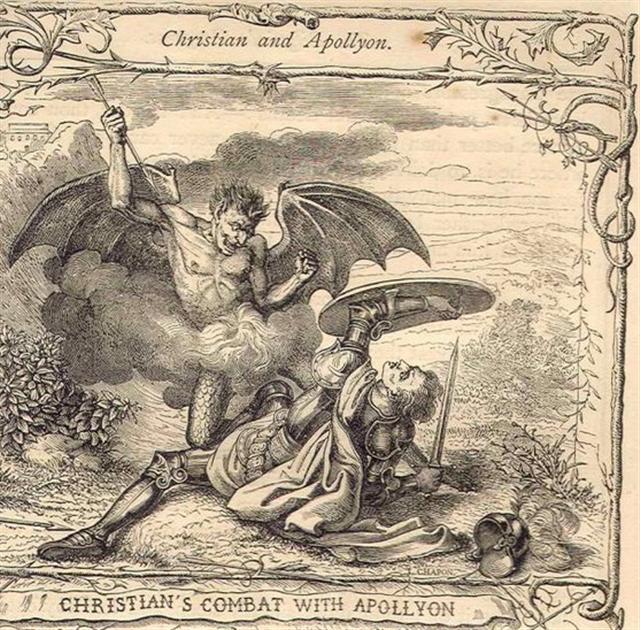 |
| °Dec 10 (*264) |
11 (345) |
12 |
13 |
14 |
| 'Nov 17 (*241) |
18 |
19 |
20 (324) |
21 |
| "Nov 3 (*227) |
4 |
Ko Ruti 5 |
6 (310) |
7 |
| NAKSHATRA DATES: |
| 3-28 |
3-29 |
3-30 |
3-31 (*375) |
4-1 (91) |
| APRIL 12 |
13 (468) |
14 (104) |
15 (*390) |
16 (*26) |
| μ Columbae, SAIPH (Sword) = κ Orionis (86.5), τ Aurigae, ζ Leporis (86.6) |
υ Aurigae (87.1), ν Aurigae (87.2), WEZN (Weight) = β Columbae, δ Leporis (87.7), TZE (Son) = λ Columbae (87.9) |
Ardra-6 (The Moist One) / ANA-VARU-8 (Pillar to sit by)
χ¹ Orionis, ξ Aurigae (88.1), BETELGEUZE (House of the Giant) = α Orionis (88.3), ξ Columbae (88.5), σ Columbae (88.7)
ZUBEN ELGENUBI (α Librae)
|
η Leporis (89.0), PRAJA-PĀTI (Lord of Created Beings) = δ Aurigae, MENKALINAN (Shoulder of the Rein-holder) = β Aurigae, MAHASHIM (Wrist) = θ Aurigae, and γ Columbae (89.3), π Aurigae (89.4), η Columbae (89.7) |
μ Orionis (90.3), χ² Orionis (90.5) |
| June 15 |
16 |
17 (168 = 80 + 88) |
18 |
19 (*90) |

... The earliest depiction that has been linked to the constellation of Orion is a prehistoric (Aurignacian) mammoth ivory carving found in a cave in the Ach valley in Germany in 1979. Archaeologists have estimated it to have been fashioned approximately 32,000 to 38,000 years ago ... The artist cut, smoothed and carved one side (A) and finely notched the other side (B) and the edges. Side A contains the half-relief of an anthropoidal figure, either human or a human-feline hybrid, known as the 'adorant' because its arms are raised as if in an act of worship.
| Egyptian jubilation |
 |
Phoenician he |
 |
Greek epsilon |
Ε (ε) |
|
Wikipedia points at the Egyptian gesture with arms held high as a Sign of jubilation, which may have been the origin (via Phoenician he) of epsilon.


|
On side B together with the four edges is a series of notches that are clearly set in an intentional pattern. The edges contain a total of 39 notches in groups of 6, 13, 7 and 13. A further 49 notches on side B are arranged in four vertical lines of 13, 10, 12 and 13 respectively plus a further notch that could be in either of the middle two lines ... The grouping of the notches on the plate suggests a time-related sequence. The total number of notches (88) not only coincides with the number of days in 3 lunations (88.5) but also approximately with the number of days when the star Betelgeuse (α Ori) disappeared from view each year between its heliacal set (about 14 days before the spring equinox around 33,000 BP) and its heliacal rise (approximately 19 days before the summer solstice).
Conversely, the nine-month period when Orion was visible in the sky approximately matched the duration of human pregnancy, and the timing of the heliacal rise in early summer would have facilitated a ‘rule of thumb’ whereby, by timing conception close to the reappearance of the constellation, it could be ensured that a birth would take place after the severe winter half-year, but leaving enough time for sufficient nutrition of the baby before the beginning of the next winter. There is a resemblance between the anthropoid on side A and the constellation Orion. None of these factors is convincing when taken in isolation, because of the high probability that apparently significant structural and numerical coincidences might have arisen fortuitously. However, taken together they suggest that the anthropoid represented an asterism equivalent to today’s constellation of Orion, and that the ivory plate as a whole related to a system of time reckoning linked to the moon and to human pregnancy. If so, then ethnographic comparisons would suggest that the Geißenklösterle culture related their ‘anthropoid’ asterism to perceived cycles of cosmic power and fertility ...
|
| °June 11 |
12 |
13 (164) |
14 |
15 (*86) |
| 'May 19 (*59) |
20 |
21 (141) |
22 |
23 (*63) |
| "May 5 |
Vaitu Potu 6 |
7 (127) |
8 |
9 (*49) |
 |
 |
 |
 |
 |
| Ga1-22 |
Ga1-23 |
Ga1-24 |
Ga1-25 |
Ga1-26 |
Counted from Sirrah to Betelgeuze there were 88 days:
 |
86 |
 |
 |
383 |
| Gb6-26 |
Ga1-23 |
Ga1-24 |
| SIRRAH |
*87 |
BETELGEUZE |
| 88 |
384 |
| 472 |
We can now better understand what Homer meant with his huge door-stone not possible to lift up from the ground, not even with 22 four-wheeled wains → 88:
.. Odysseus and his fleet were now in a mythic realm of difficult trials and passages, of which the first was to be the Land of the Cyclopes, 'neither nigh at hand, nor yet afar off', where the one-eyed giant Polyphemus, son of the god Poseidon (who, as we know, was the lord of tides and of the Two Queens, and the lord, furthermore, of Medusa), dwelt with his flocks in a cave.
'Yes, for he was a monstrous thing and fashioned marvelously, nor was he like to any man that lives by bread, but like a wooded peak of the towering hills, which stands out apart and alone from others.' Odysseus, choosing twelve men, the best of the company, left his ships at shore and sallied to the vast cave. It was found stocked abundantly with cheeses, flocks of lambs and kids penned apart, milk pails, bowls of whey; and when the company had entered and was sitting to wait, expecting hospitality, the owner came in, shepherding his flocks.
He bore a grievous weight of dry wood, which he cast down with a din inside the cave, so that in fear all fled to hide. Lifting a huge doorstone, such as two and twenty good four-wheeled wains could not have raised from the ground,
... The seventh tree is the oak, the tree of Zeus, Juppiter, Hercules, The Dagda (the chief of the elder Irish gods), Thor, and all the other Thundergods, Jehovah in so far as he was 'El', and Allah. The royalty of the oak-tree needs no enlarging upon: most people are familiar with the argument of Sir James Frazer's Golden Bough, which concerns the human sacrifice of the oak-king of Nemi on Midsummer Day. The fuel of the midsummer fires is always oak, the fire of Vesta at Rome was fed with oak, and the need-fire is always kindled in an oak-log. When Gwion writes in the Câd Goddeu, 'Stout Guardian of the door, His name in every tongue', he is saying that doors are customarily made of oak as the strongest and toughest wood and that 'Duir', the Beth-Luis-Nion name for 'Oak', means 'door' in many European languages including Old Goidelic dorus, Latin foris, Greek thura, and German tür, all derived from the Sanskrit Dwr, and that Daleth, the Hebrew letter D, means 'Door' - the 'l' being originally an 'r'. Midsummer is the flowering season of the oak, which is the tree of endurance and triumph, and like the ash is said to 'court the lightning flash'. Its roots are believed to extend as deep underground as its branches rise in the air - Virgil mentions this - which makes it emblematic of a god whose law runs both in Heaven and in the Underworld ... The month, which takes its name from Juppiter the oak-god, begins on June 10th and ends of July 7th. Midway comes St. John's Day, June 24th, the day on which the oak-king was sacrificially burned alive. The Celtic year was divided into two halves with the second half beginning in July, apparently after a seven-day wake, or funeral feast, in the oak-king's honour ...
he set this against the mouth of the cave, sat down, milked his ewes and goats, and beneath each placed her young, after which he kindled a fire and spied his guests.
Two were eaten that night for dinner, two the next morning for breakfast, and two the following night. (Six gone.) But the companions meanwhile had prepared a prodigous stake with which to bore out the Cyclops' single eye; and when clever Odysseus, declaring his own name to be Noman, approached and offered the giant a skin of wine, Polyphemus, having drunk his fill, 'lay back', as we read, 'with his great neck bent round, and sleep that conquers all men overcame him.' Wine and fragments of the men's flesh he had just eaten issued forth from his mouth, and he vomited heavy with drink. 'Then', declared Odysseus, I thrust in that stake under the deep ashes, until it should grow hot, and I spake to my companions comfortable words, lest any should hang back from me in fear. But when that bar of olive wood was just about to catch fire in the flame, green though it was, and began to glow terribly, even then I came nigh, and drew it from the coals, and my fellows gathered about me, and some god breathed great courage into us. For their part they seized the bar of olive wood, that was sharpened at the point, and thrust it into his eye, while I from my place aloft turned it about, as when a man bores a ship's beam with a drill while his fellows below spin it with a strap, which they hold at either end, and the auger runs round continually.
Even so did we seize the fiery-pointed brand and whirled it round in his eye, and the blood flowed about the heated bar. And the breath of the flame singed his eyelids and brows all about, as the ball of the eye burnt away, and the roots thereof crackled in the flame. And as when a smith dips an ax or adze in chill water with a great hissing, when he would temper it - for hereby anon comes the strength of iron - even so did his eye hiss round the stake of olive. And he raised a great and terrible cry, that the rock rang around, and we fled away in fear, while he plucked forth from his eye the brand bedabbled in much blood. Then maddened with pain he cast it from him with his hands, and called with a loud voice on the Cyclopes, who dwelt about him in the caves along the windy heights. And they heard the cry and flocked together from every side, and gathering round the cave, called in to ask what ailed him. 'What hath so distressed thee, Polyphemus, that thou criest thus aloud through the immortal night, and makest us sleepless? Surely no mortal driveth off thy flocks against thy will: surely none slayeth thyself by force or craft?'
And the strong Polyphemus spake to them again from out of the cave: 'My friends, Noman is slaying me by guile, nor at all by force.' And they answered and spake winged words: 'If then no man is violently handling thee in thy solitude, it can in no wise be that thou shouldst escape the sickness sent by mighty Zeus. Nay, pray thou to thy father, the lord Poseidon.' On this wise they spake and departed; and my heart within me laughed to see how my name and cunning counsel had beguiled him ...
Betelgeuze would return to visibility 16 days later than its true heliacal rising, viz. in right ascension day *88 + *16 = *104, which right ascension line at the time of the Bull would have been at Ga4-21 (104) and 16 days after the Little King (Regulus, Sharru): ... When Nonoma urinated out in the night it ought to have been an allusion to Zosma and Coxa - both of them female in character (like the rib of Adam which was used to create Eve):
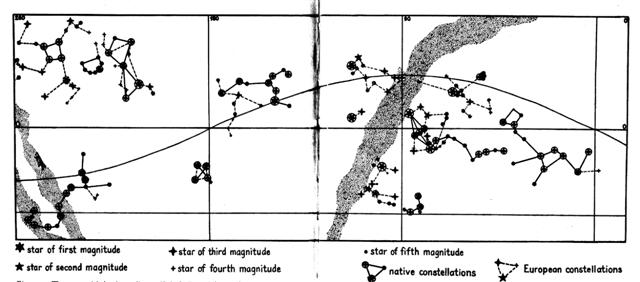
| 6-2 (153) |
14 |
6-17 (168) |
6-18 |
6-19 |
| JUNE 17 (168) |
JULY 2 |
3 (*104) |
4 (185) |
 |
 |
 |
 |
| Ga4-5 (88) |
Ga4-20 |
Ga4-21 (104 = 182 - 78) |
Ga4-22 |
|
Al Jabhah-8 (The Forehead) / Maghā-10 (Bountiful) / Sharru-14 (King)
10h (152.2)
AL JABHAH = η Leonis (152.4), REGULUS = α Leonis (152.7) |
11h (167.4)
χ Leonis, χ¹ Hydrae (167.1), χ² Hydrae (167.3) |
AL SHARAS (The Ribs) = β Crateris (168.6) |
Al Zubrah-9 (The Mane) / Purva Phalguni-11 (First Reddish One)
ZOSMA (Girdle) = δ Leonis (169.2), COXA (Hips) = θ Leonis (169.4) |
| Aug 20 (232) |
Sept 4 |
5 (248 = 104 + 144) |
6 |
| °Aug 16 (*148) |
°Aug 31 |
°Sept 1 (244) |
2 |
| 'July 24 (*125) |
'Aug 8 (*140) |
9 |
10 (222) |
| Anakena 10 (191) |
"July 25 (*126) |
Anakena 26 (207) |
27 (288 - 80) |
|
... They took their provisions with them, carrying them on their shoulders, went on, and reached Te Pou. They made camp and slept in Te Pou on the tenth day of the month of July ('Anakena').
| [E:22] he amoamo he oho he tuu ki te pou he noho |
| he moe i te pou.i te angahuru o te raa.ko te |
| anakena. |
Amo.
To carry on one's shoulders: O Yetú i-amo-ai te tatauró ki
ruga ki-te maúga Kalvario. Jesus carried his cross up to the Calvary.
Amoga, bundle; to tie in a bundle: he-amoga i te hukahuka, to tie
a bundle of wood. Vanaga. 1. A yoke, to carry; amoga, burden, load.
2. To bend, to beat a path. Churchill. Âmo.
1. To clean, to clean oneself: he-âmo i te umu, to clean the earth
oven; ka-âmo te hare, ka haka-maitaki, clean the house, make it good;
he-âmo i te ariga, to clean one's face wetting it with one's hand. 2.
Clear; ku-âmo-á te ragi, the sky is clear. 3. To slip, to slide, to
glide (see pei-âmo). Ámoámo, to lick up, to lap up, to dry; to
slap one's body dry (after swimming or bathing): he-âmoâmo i te vaihai
rima. Vanaga. Amoamo.
1. To feed, to graze. 2. To spread, to stretch (used of keete).
Churchill.
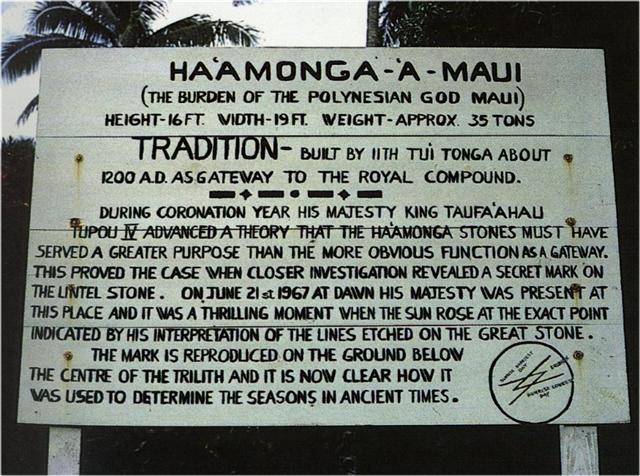
|
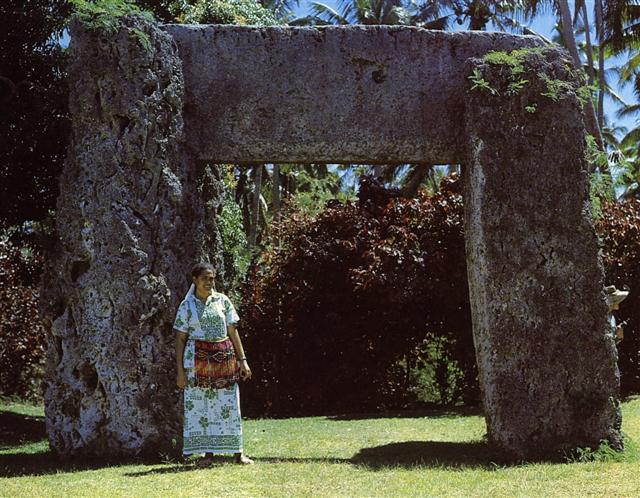
Maui was born in the topknot of Taraga, which we can figure out should have been at 0h, at Sirrah:
| ... Maui was the fifth and youngest of his parents' sons, yet when he was born his brothers knew nothing of it. They first learned that they had a brother when he was discovered one night standing behind them in the great meeting house. Everyone was present, the four brothers, their mother Taranga, and all the relations, and there was dancing going on, when little Maui crept into the house unseen, and went and sat behind his brothers. When it came to their turn to dance, and their mother stood them up and counted them so as to be ready, he stood up with them. 'One, that's Maui mua; two, that's Maui roto; three, that's Maui taha; four, that's Maui pae', she said; these names mean Maui the first, Maui the middle, Maui the side, and Maui the edge. Then she saw this other child standing with them, and cried out, 'Hullo, where did this one come from?' 'I'm your child too', Maui replied. So she counted them again and said, 'Oh no, there ought to be only four of you. This is the first I've seen of you.' And so there was a scene, with little Maui and the old woman arguing about it in the middle of the rows of dancers. In the end she became annoyed with him. 'Now, come on, out of the house!' she said. 'You are no child of mine, you belong to someone else. Go home!' But little Maui stood up for himself. 'Well then, I'd better go, I suppose', he said. 'Since you say so, I must be someone else's child. But I did think I was yours, because I know I was born at the edge of the sea, and you cut off a tuft of your hair and wrapped me in it and threw me in the waves. After that the seaweed took care of me and I drifted about in the sea, wrapped in long tangles of kelp, until a breeze blew me on shore again, and some jelly-fish rolled themself around me to protect me on the sandy beach. Clouds of flies settled on me and I might have been eaten up by the maggots; flocks of seabirds came, and I might have been pecked to pieces. But then my great-ancestor Tama nui ki te rangi arrived. He saw the clouds of flies and all the birds, and he came and pulled away the jelly-fish, and there was I, a human being! Well, he picked me up and washed me and took me home, and hung me in the rafters in the warmth of the fire, and he saved my life. And I grew, and eventually I heard about the dancing you have here in this house, and that is what brought me here tonight.'
Now Taranga listened to all this in amazement. For in the custom of our people, if a child was born before it finished growing in its mother's womb and died without knowing any of the pleasures of life, it was supposed to be buried with special prayers and ceremonies, otherwise it became a kind of evil spirit, always doing mischief to the human race and hurting them out of spite, because of having missed the happiness that they enjoy. All the evil spirits had a beginning of this sort. So Maui was a little demi-god of mischief. The story he had told was true, and as his mother listened she remembered it all. 'From the time I was in your womb,' Maui went on, 'I have known the names of these children of yours. Listen,' he said as he pointed to his brothers in turn. 'You are Maui mua, you are Maui roto, you are Maui taha, and you are Maui pae. And as for me, I am Maui potiki, Maui-the-last-born. And here I am.'
When he had finished, Taranga had to wipe her eyes because there were tears in them, and she said: 'You are indeed my lastborn son. You are the child of my old age. When I had you, no one knew, and what you have been saying is the truth. Well, as you were formed out of my topknot you can be Maui tikitiki a Taranga.' So that became his name, meaning Maui-formed-in-the-topknot-of-Taranga. And this is very strange, because women in those days did not have topknots. The topknot was the most sacred part of a person, and only men had them ...
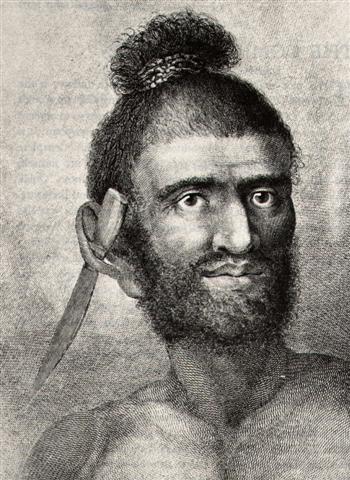
|
| Tara. 1. Thorn: tara miro. 2. Spur: tara moa. 3. Corner; te tara o te hare, corner of house; tara o te ahu, corner of ahu. Vanaga. (1. Dollar; moni tara, id.) 2. Thorn, spike, horn; taratara, prickly, rough, full of rocks. P Pau.: taratara, a ray, a beam; tare, a spine, a thorn. Mgv.: tara, spine, thorn, horn, crest, fishbone. Mq.: taá, spine, needle, thorn, sharp point, dart, harpoon; taa, the corner of a house, angle. Ta.: tara, spine, horn, spur, the corner of a house, angle. Sa.: tala, the round end of a house. Ma.: tara, the side wall of a house. 3. To announce, to proclaim, to promulgate, to call, to slander; tatara, to make a genealogy. P Pau.: fakatara, to enjoin. Mq.: taá, to cry, to call. 4. Mgv.: tara, a species of banana. Mq.: taa, a plant, a bird. Ma.: tara, a bird. 5. Ta.: tara, enchantment. Ma.: tara, an incantation. 6. Ta.: tara, to untie. Sa.: tala, id. Ha.: kala, id. Churchill |
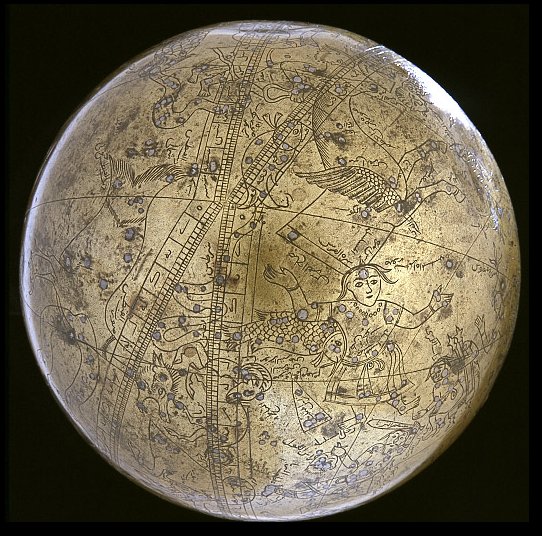
Evidently he had grown up quickly and was ready to take on his burden of duties (haka-amoga, ikatz) already 192 (= 8 * 24 = 2 * 136 - 80) days later:
| Sept 20 (263) |
191 |
March 30 (455) |
31 (90) |
190 |
Oct 8 |
9 (282) |
| no glyph |
 |
 |
 |
 |
| Ca7-24 (192) |
Ca7-25 → 360 |
*Ca14-21 (384) |
*Ca14-22 |
| March 21 (80) |
Sept 29 |
30 (273) |
April 8 |
9 (465) |
| 386 = 2 * 193 |
| ... Now every morning at daybreak, Taranga used to wake up before her children and leave the house, and vanish until night. The older brothers were used to this, they knew that their mother was there at night but gone in the morning, but little Maui was not used to it and he found it very annoying. At first he thought in the mornings, 'Well, perhaps she has only gone to prepare some food for us.' But no, she really was gone, she was far away. In the evening, when her children were all singing and dancing in the meeting house as usual, she used to return. And after the dancing she called young Maui to her sleeping mat, and this happened every night. And as soon as the daylight came she disappeared again. One day Maui asked his brothers to tell him where their mother and father lived. He said he wanted to visit them. They said they did not know. 'How can we tell?' they said. 'We don't know whether they live up there somewhere, or down below, or over there.' 'Well, never mind,' said Maui, 'I'll find them for myself.' 'Nonsense,' they said, 'how can you tell where they are, you, the youngest of all of us, when we ourselves don't know? After that first night when you turned up in the meeting house and made yourself known to us all, you know that our mother slept here every night, and as soon as the sun rose she went away, and she came back at evening, and this is how it always is. How can we tell where she goes?' Now when Maui had this conversation with his brothers he had already discovered something for himself. During the previous night, as his mother and brothers were all sleeping, he had crept out and stolen his mother's skirt, her woven belt, and her warm, feathered cloak, and had hidden them. Then he had taken various garments and stopped up all the chinks around the doorway of the house and of its single wooden window, so that the first light of day would not get in and Taranga would not wake in time to go. When that was done he could not sleep. He was afraid his mother would wake up in the dark and spoil the trick. But Taranga did sleep on. When the first faint light appeared at the far end of the house, Maui could see the legs of all the other people sleeping, and his mother was sleeping too. Then the sun came up, and Taranga stirred, and partly woke. 'What kind of night is this,' she wondered, 'that lasts so long?' But because it was dark in the house she dozed off again. At last she woke up properly, and knew that something was wrong. She threw off the cloak that covered her and jumped up, with nothing on, and went round looking for her skirt and belt. Little Maui pretended to be fast asleep.
Taranga rushed to the door, and the window beside it, and pulled out all the things that Maui had used to stop them up. When she saw that the sun was already in the sky she muttered some angry things and hurried out, holding in front of her a piece of old flax cloak that Maui had used to stop up the door. Away she ran, crying and whimpering in being so badly treated by her children. No sooner was she out of the house than little Maui was on his knees behind the sliding door, which she had closed behind her as she left. He was watching to see which way she went. Not far away he saw her stop and pull up a clump of rushes. There was a hole under it, which she dropped into. She pulled the rushes into place behind her, and was gone. Maui slipped out and ran as fast as he was able to the clump of rushes. He pulled it and it came away, and he felt a wind against his face as he looked through the hole. Looking down, he saw another world, with trees and the ocean, and fires burning, and men and women walking about. He put the rushes back, and returned to the house and woke his brothers, who were still fast asleep. 'Come on, come on! Wake up!' he cried. 'Here we are, tricked by our mother again!' So they all got up, and realised from the height of the sun that they had overslept. That was the day when Maui asked them to tell him where his parents lived. He did not admit what he had seen that morning. And they said they did not know, and he would never know either.
'What does it matter to you, anyway?' they said. 'Do we care about our father or our mother? Did she feed us and look after us until we grew up? Not a bit of it. She went off every morning, just like this. Our true father, without any doubt, is great Rangi the Sky, whose offspring provide us with trees for our houses and birds and fishes for us to eat, and sweet potatoes and fern root. And who was it that sent those other offspring down to help us - Touarangi, the rain that waters our plants. Hau ma rotoroto, the fine weather that enables them to grow, Hau whenua, the soft winds that cool them, and Hau ma ringiringi, the mists that keep them moist? Did not Rangi give us all of these to make our food grow, and did not Papa make the seeds sprout in the earth? You know all this.' 'I certaínly do know it all,' said Maui. 'In fact I know it far better than you do. For I was nursed and fed by the sea-tangles, whereas you four were nursed at our mother's breast. It could not have been until after she weaned you that you ate the foods you speak of, whereas I have never tasted either her milk or her cooking. Yet I love her, because I once lay in her womb. And because I love her, I want to find out where she and our father live, and go and see them.' The other four were astonished when they heard their little brother speak like this. When they recovered themselves and were able to keep their faces straight, they glanced at one another and decided that they might as well let him have his way, and go to find their parents.
Now Maui had already performed some of his magic for them on the night when they first set eyes on him, in the meeting house. On that occasion, in front of all his relatives, he had transformed himself into all kinds of birds that live in the forest. None of the shapes he assumed had pleased them particularly then, but now he turned himself into a kereru, or wood pigeon, and with this they were delighted. 'Heavens!' they said. 'You do look handsome. Much more beautiful than the birds you showed us last time.' What made him look so splendid now was that he was wearing the belt and skirt he had stolen from his mother that morning. The thing that looked so white across the pigeon's breast was his mother's belt. He also had the sheen of her skirt, that was made of burnished hair from the tail of a dog, and it was the fastening of her belt that made the beautiful feathers at his throat. This is how the wood pigeon got its handsome looks. Maui now perched on the branch of a tree near his brothers, and there, just like a real kereru, he sat quite still in one place. He did not hop from bough to bough like other birds, but sat there cooing to himself. Which made his brothers coin our proverb, 'The stupid pigeon sits on one bough and does not hop from place to place.' And they went away, and left him to change his shape again.
Next morning Maui prepared to set off in search of his parents. Before he left, he astonished his older brothers once again by making quite a speech. 'Now you stay here,' said little Maui, 'and you'll be hearing something of me after I am gone. It is because I love my parents so much that I am going off to look for them. Listen to me, and say whether the things I have been doing are remarkable or not. Changing into birds can only be done by someone who is skilled in magic, yet here I am, younger than all of you, and I have turned myself into all the birds of the forest, and now I am going to take the risk of growing old and losing my powers because of the great length of the journey to the place where I am going.'
'That might be so,' said his brothers, 'if you were going on some warlike expedition. But in fact you are only going to look for those parents whom we all love, and if you ever find them we shall all be happy. Our present sadness will be a thing of the past, and we shall spend our lives between this place and theirs, paying them happy visits. What is there to be afraid of?' Little Maui went on, very serious. 'It is certainly a very good cause that leads me to undertake this journey, and when I reach the place I am going to, if I find everything agreeable, then I shall be pleased with it, and if I find it disagreeable, then I shall be disgusted with it.' The brothers kept straight faces, and replied: 'What you say is exceedingly true, Maui. Depart then, on your yourney, with your great knowledge and your skill in magic.' Then their brother went a little way into the forest, and came back in the shape of a pigeon once more, with his sheeny back and his white breast and his bright red eye. His brothers were charmed, and there was nothing they could do but admire him, as he flew away. Away flew Maui in his pigeon shape, with his brothers admiring him as he went. But as soon as he was out of sight he wheeled about, and flew to the clump of rushes that marked the place where his mother disappeared. He came down, in his noisy pigeon way, and strutted about for a moment. Then he lifted the rushes. He flopped into the hole and replaced the clump behind him, and was gone. A few strokes of his wings took him to that other country, and soon he saw some people talking to one another on the grass beneath some trees. They were manapau trees, a kind that grows in that land and nowhere else.
Maui flew down to the tops of the trees and, without being noticed by any of the people, perched on a branch that enabled him to see them. Almost at once he recognized Taranga, sitting on the grass beside her husband, a man who by his dress and demeanor was plainly a chief. 'Aha,' he cooed to himself, 'there are my father and my mother just below me.' And soon he knew that he was not mistaken, for he heard their names when other members of the party spoke to them. He flopped down through the leaves and perched on the branch of a puriri tree thad had some berries on it. He turned his head this way and that, and tilted it on its side. Then he pecked off one of the berries and gently dropped it, and it hit his father's forehead. 'Was that a bird, that dropped that berry?' one of the party asked. But the father said No, it was only a berry that fell by chance. So Maui picked some more berries, and this time he threw them down quite hard, and they hit both the father and the mother and actually hurt them a little. Then everyone got up and walked round peering into the branches of the tree. The pigeon cooed, and everyone saw it. Some went away and gathered stones, and all of them, chiefs and common people alike, began throwing stones up into the branches. They threw for a long time without hitting the pigeon once, but then a stone that was thrown by Maui's father struck him. It was Maui, of course, who decided that it should, for unless he had wished it, no stone could have struck him. It caught his left leg, and down he fell, fluttering through the branches to the ground. But when they ran to pick the bird up, it had turned into the shape of a young man ... 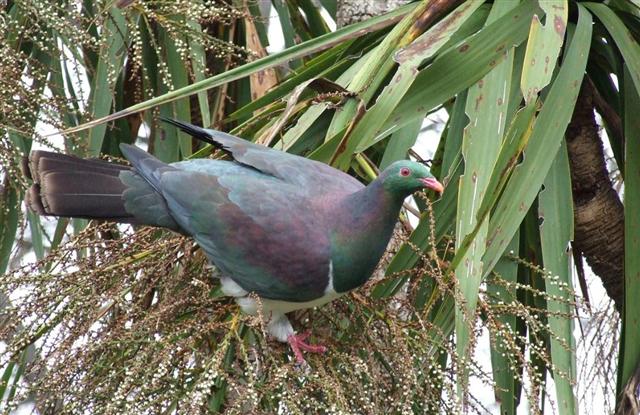
|
The left wing of Columba was very close to Furud (ζ Canis Majoris) at the right leg ('the young man') of the Great Dog:
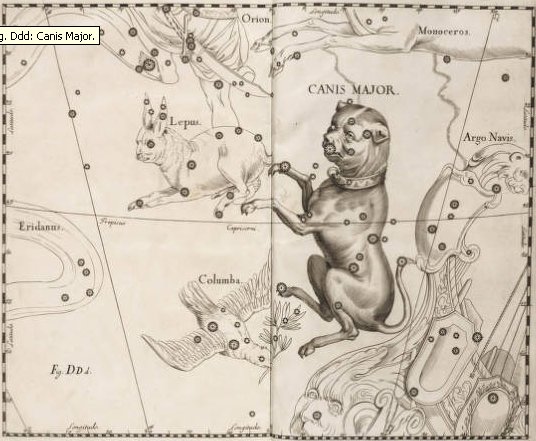
| CLOSE TO THE SUN: |
| OCT 19 (292) |
20 |
21 (*214) |
 |
 |
 |
| Ga8-9 |
Ga8-10 |
Ga8-11 (214 = 2 * 107) |
| Dec 22 |
23 (357) |
CHRISTMAS EVE |
|
... Once upon a time there was an old woman who owned a great potato field (mara) where she planted her potatoes in spring and harvested them in autumn. She was famous all around for her many varieties of wonderful potatoes, and she had enough of them to sell at the market place. She planted her potatoes 7 in a row, placing her foot in front of her as a measure from one potato to the next. Then she marked the place with a bean - which would also give nourishment to the surrounding potatoes. Next she changed variety and planted 7 more followed by another bean, and this was the pattern she followed until all her 214 varieties had been put down in their proper places. She had drawn a map which she followed and from where each sort of potato could be located at the proper time for its harvest ... |
| °Dec 18 (*272) |
19 |
20 (354 = 236 + 118) |
| 'Nov 25 (*249) |
26 |
27 |
| "Nov 11 (314 + 1) |
12 |
Ko Ruti 13 (*236) |
| NAKSHATRA DATES: |
| "May 13 (133 = 315 - 182) |
Vaitu Potu 14 (*54) |
15 (365 + 135 = 500) |
 |
 |
 |
| FURUD = ζ Canis Majoris (94.9) |
Well-22 (Tapir) / Arkū-sha-pu-u-mash-mashu-8 (Back of the Mouth of the Twins)
δ Columbae (95.2), TEJAT POSTERIOR = μ Gemini, MIRZAM (The Roarer) = β Canis Majoris (95.4), CANOPUS = α Carinae (95.6), ε Monocerotis (95.7), ψ1 Aurigae (95.9) |
no star listed (96) |
| Ga1-30 |
Ga2-1 |
Ga2-2 (32 = 96 - 64) |
| June 23 (*94) |
ST JOHN'S DAY (*460) |
25 (176) |
... A Maori saying: he iti toki, e rite ana ki te tangata = though the adze be small, yet does it equal a man ...
|
The difference between the number of knots on the left side of the tresses of Pachamama and those on her right side were probably meant to illustrate number 32:
|
Counting the tresses of Pachamama (the World Mother) from left to right: |
|
1 |
29 |
90 = 106 - 16 |
1 |
26 |
78 = 168 - 90 |
|
2 |
30 |
2 |
26 |
|
3 |
31 |
3 |
26 |
|
4 |
34 |
214 - 180 |
4 |
25 |
104 = 88 + 16 |
|
5 |
31 |
90 = 106 - 16 |
5 |
26 |
|
6 |
30 |
6 |
27 |
|
7 |
29 |
7 |
26 |
|
214 (AUGUST 2) + 26 * 7 = 396 (JANUARY 31) |
|
... Ecclesiastically, the equinox is reckoned to be on 21 March (even though the equinox occurs, astronomically speaking, on 20 March [79] in most years) ... |
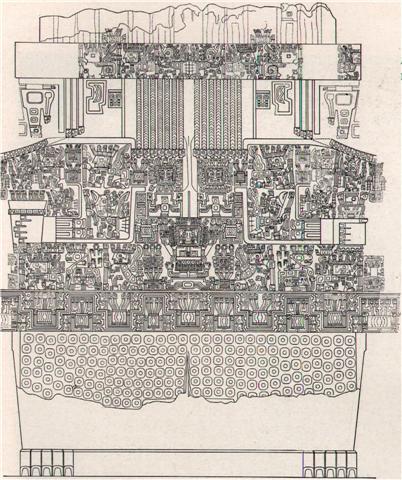
| no glyph |
 |
4 |
 |
386 |
 |
4 |
 |
| Ca1-1 |
Ca1-6 |
Cb1-1 (393) |
Cb1-6 (398 = 32 + 366) |
| CLOSE TO THE SUN: |
| SIRRAH (*0) |
ALGENIB PEGASI |
4 |
*6 |
20 |
SHERATAN (*27) |
4 |
*32 |
| March 21 (0h) |
22 (81) |
27 (86) |
April 17 (107) |
22 (112 = 80 + 32) |
| NAKSHATRA DATES: |
| *183 |
*184 (= *1 + *183) |
4 |
*189 |
20 |
*210 |
4 |
ARCTURUS (*215) |
| Sept 20 |
21 (264 = 81 + 183) |
26 (269) |
Oct 17 (290) |
22 (295) |
|




























